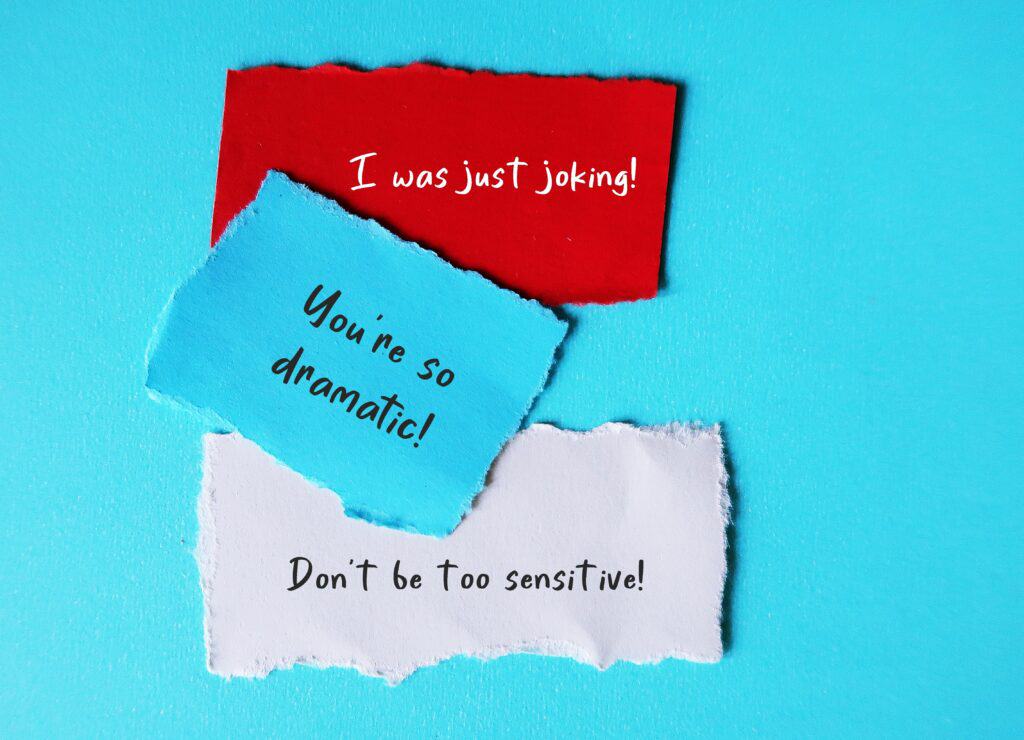Gaslighting has gained more public attention in recent years, but the term isn’t always used in the right context. It’s a form of abuse that undermines a person’s reality, often with subtle manipulation, but it isn’t limited to harmful behavior.
Breaking the cycle means knowing what gaslighting looks like, how it sustains itself, and how to counter it safely. In this guide, we’ll break down what you need to know about gaslighting in relationships – including what public discourse misses. Let’s start with a definition that can help us identify its many forms.
What is gaslighting?
Depending on who you ask, you might get a different definition of what gaslighting is. Even clinical fields can agree on the theory but not the root cause. There’s also the popular definition shaped by how the public talks about gaslighting.
Generally, gaslighting is a type of abuse that happens in a relationship, where the abuser makes the victim doubt their sanity. We can identify it by three traits that tend to come up:
- Controlling an interpersonal environment like a relationship
- Diminishing the victim’s sense of reality
- Maintaining control with an unequal power balance
Those are the core elements of gaslighting in relationships. But what do they say about gaslighters and their behavior?
Why do people do this?
Gaslighting isn’t easy to identify, especially for the person experiencing it in real-time. Being in an intimate relationship can make it easier to hide the abuse from friends and family too. Some people don’t even recognize that what they’re doing is manipulative and abusive.

The Sociology of Gaslighting argues that the abuse is “rooted in social inequalities, including gender, and executed in power-laden intimate relationships.”
The paper focuses on social inequalities that make people more vulnerable to abusers. Gender, sexuality, race, and nationality aren’t just social concepts. They influence the power dynamic in our relationships.
Femininity is still wrongly associated with irrationality throughout society. A victim’s nationality or race can limit their access to intervention and professional services. Abuse in queer relationships rarely gets handled with the same care in general discussions, if it comes up at all.
12 Warning signs that you are being gaslighted
Gaslighting in relationships isn’t always obvious. It takes many forms, and the person on the receiving end can experience harm without experiencing a full-on breakdown. Gaslighting is subtle, so subtle that it creeps into any part of society where there’s a power imbalance.
Writing about her experiences of gaslighting in medicine, Sarah Fraser MD notes:
“The most striking and easily identifiable context might be the gaslighting of a younger, racialized, woman, non-specialized health care worker. . .anyone in a position of power can be a perpetrator.”
This is in a field where professionals have to document their words, actions, and treatment of those in their care. It even happens among colleagues who must abide by the same code of ethics.
A relationship is prone to the same abuse of power without the protections, but there are ways to identify it. If you’ve felt any of these signs, it may be worth evaluating if you’ve been gaslighted in a relationship.
1. Doubting your reality
Gaslighting undermines your sense of reality. It’s meant to make you doubt your experience of the world around you, and what’s happening to you. Gaslighters use this tactic to hide their behavior while manipulating your reality, making it harder to call them out.
2. Invalidated feelings
Even when you know they harmed you, a gaslighting partner will try to invalidate your feelings. They’ll deny any wrongdoing, lie about events, and center their own emotions to minimize yours. This can often make victims feel guilty when they try to push back against the abuse.
3. Thinking “Am I too sensitive?”
When we’re exposed to gaslighting for long periods, we can end up internalizing the things said to us. Manipulative partners will often say things like “You’re overreacting!” or “Why are you so sensitive?” to deflect blame. Remember that these are tactics meant to control the narrative and not a reflection of the truth.

4. Not trusting your judgment
Our experiences inform the decisions we make. When someone undermines how we remember events, they make it harder to trust our judgment. Gaslighting may be subtle, but intuition alerts us to danger long before we can put a name to it. Gaslighters try to paint logical reactions as irrational – it makes it harder for their partners to take action, push back, or leave.
5. Walking on eggshells around your partner
Even when your judgment is attacked, instinct may still tell you to be wary of your partner. A relationship is an intimate environment – a space where you should feel safe, where you can be vulnerable with those you share it with.
When we share this environment with abusive people, the only time we feel safe is when they’re not there. If they’re present, you may find yourself doing everything to keep them happy to keep the treat at bay.
6. Feeling isolated and helpless
Intimacy is a wonderful feeling, but gaslighting robs us of it. It takes the joy out of being someone while keeping us trapped in a toxic relationship. This can be deeply isolating, especially since abusers tend to isolate their partners from friends, family, and outside support. This is sometimes an unforeseen psychological abuse that happens to the victim.
7. Unsure about who you are
Gaslighting doesn’t just target our external reality, it attacks how we see ourselves internally too. The Sociology of Gaslighting notes how it creates a “surreal” environment.
As an art form, surrealism creates bizarre, irrational, dream-like scenes. It’s the distortion of reality that unnerves us and gaslighting distorts our sense of self in similar ways. The effect can be amplified for marginalized people who have to interact with the world through their identities – the same ones that skew the power balance in society.
8. Defending the abuse
Gaslighting partners deflect blame by turning it back on their targets. You might bring up a concern or point out their problematic behavior, only for them to make it your fault. Internalizing the blame can make victims of gaslighting feel guilty, even to the point of defending their partners when others call them out.
9. Apologizing all the time
Internalized blame can also leave you constantly apologizing to your partner when you’ve done nothing wrong. Power dynamics in the relationship often play a role here too.

If you’re financially dependent on your partner, they can weaponize this to make you feel like a burden. In patriarchal societies, where masculine partners expect submission, raising conflict can be treated as a bigger offense than the original harm.
10. Assuming the worst about yourself
When our sense of identity is distorted, so is our ability to interpret how others see us. Being shamed and manipulated by someone you’re meant to love and trust is hurtful enough. Over time, gaslighting in a relationship convinces us that others see us as our partners do. That isn’t a true reflection of who you are, it’s a perception based on a lie.
11. Struggling to make simple decisions
People want to make good decisions that improve their lives. We want to make the most of our lives, relationships, and the things we care about. When our reality is warped, it’s hard to know what those things are, let alone what to do with them.
Making simple day-to-day choices is hard enough when it only results in snide comments and putdowns. One of the hardest decisions for targets of gaslighting is whether or not to leave the relationship. Abusive partners know this – they keep control by focusing on the negative outcomes of any choice you make.
12. Lying to avoid accountability
Signs of gaslighting often come up during conflict. Gaslighters use their tactics to avoid taking accountability, but this doesn’t mean they don’t engage in conflict. Even when you bring things up calmly, a gaslighter may escalate things by shouting, making accusations of their own, or attacking your character.
People who gaslight others never take responsibility for their actions. They’re often defensive and volatile in the heat of the moment. They’ll do anything they can to distract from the issue, and that includes lying about things they’ve clearly done.
What to do when your partner is gaslighting you
If you notice these signs in your relationship, you may be wondering what to do next. Dealing with gaslighting can be tricky. You might be worried about how your partner will react when you point out their manipulation.
Sometimes it’s the practicalities that hold us back, like how to safely get away or access resources without them. In the end, you should be able to spot it for your own mental health.
If your partner is gaslighting you, here are some helpful steps to deal with it safely and directly.
Step 1 – Create distance
Gaslighters try to keep their partners in an environment they control, whether that’s a shared house or a dependent relationship. The best way to counter this is to get away from the environment so you can deal without the immediate danger. If possible, reach out to someone you trust and see if you can stay with them while you figure out the next steps.
Step 2 – Evaluate the power dynamic in your relationship
If you’re struggling to explain how the abuse took place, try looking at things through your power dynamic. In a relationship, it’s hard to see partners objectively, even ones who’ve harmed us. But assessing the power dynamic is a helpful way to highlight where they abused their power.
Step 3 – Document the real issues
Writing things down gives you a version of events that your partner can’t manipulate. Make a note of specific behaviors, document any evidence, and note what the actual issues are as best you can. Documentation grounds your reality in facts as they happen, and makes it easier to give context to other people.
Step 4 – Get a third-party perspective you trust
Other people are important for two reasons: perspective and support. Someone on the outside will have a different view of your relationship. Their perspective can affirm what you know is true and help restore your sense of control and judgment.
Step 5 – Work with your support network
Support comes in the form of people you trust to help you deal with a gaslighting partner. This can be family, friends, social workers, healthcare professionals, and mental health specialists. Gaslighting harms us in complex ways. Your support network is there to help you navigate a traumatic experience based on your needs.
Step 6 – Visualize your future beyond the relationship
The question of leaving is a complicated one, so we’ll answer it fully in the last section. Not everyone wants to leave an abusive partner, even when they recognize the harm. Some want to salvage the relationship, others fear the consequences, and many just don’t see a way out.
Still, it helps to imagine what your life would look like without your partner. Visualize the positive things you’d have space for if there wasn’t a harmful relationship in the way.
Step 7 – Forgive yourself
Finally, forgive yourself. Being a target of gaslighting can bring up feelings of anger and betrayal, but it can also evoke guilt. Keep in mind that the actions of an abusive partner aren’t your fault. You’re allowed to have complicated feelings about it, too – but they aren’t a reflection of who you are. Only you can define that.
Should you always end the relationship with a gaslighting partner?
We’ll end with this question because it deserves some consideration. The answer is clearer for some than others, and it’s not always “yes”. Everyone deserves the space to make decisions in their own lives, especially those who’ve had that ability taken away.
The steps above are meant to get you to a place where you can make those decisions with clarity. That said, they’re also meant to challenge what it means to stay in a relationship that undermines your autonomy, safety, and mental health.
A gaslighting partner isn’t above lying to get you to stay. They might say they’ll change or apologize or offer gifts to convince you. However, if they’re serious about changing their behavior, they should be open to counseling even without the relationship.
The best thing for your safety will always be to end an abusive relationship. If you’re thinking about staying, start by spending time away from your partner’s influence. Focus on rebuilding the things that gaslighting destroys – from your support network to your perception. In the end, you may find that life can be full without them.
Gaslighting is a relationship problem that needs immediate attention. Victims of gaslighting must be aware of the problems their gaslighting partners can cause to their mental health. If couples therapy is not an option, you can always go for our individual therapy sessions. We can help you understand it better – talk to us.

